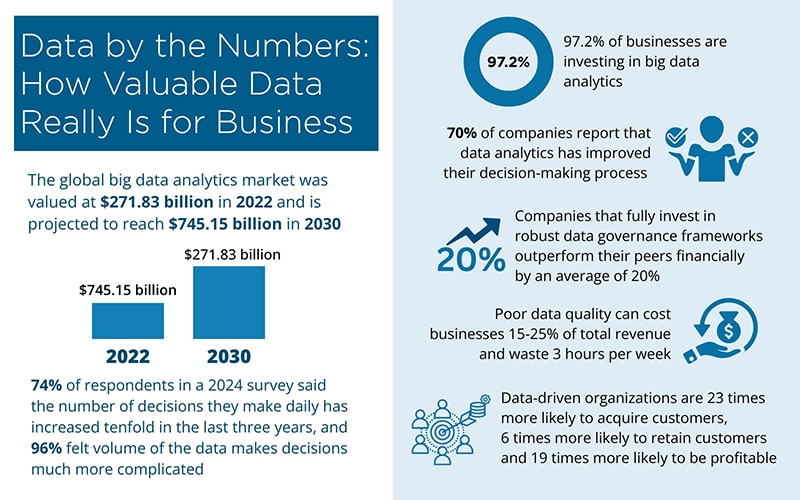In today’s competitive landscape, data is no longer just a byproduct of operations—it’s a critical business asset. The value of data for businesses is significant and continues to grow. For every business, data on customers, user experience, traffic, trends, and market research are necessary to draw insights to support growth. Big data processing involves leveraging document scanning solutions, document digitization services and analytics to extract meaningful insights from large and complex datasets. The global Big Data and Analytics market is worth an impressive £197 billion, according to a report from ProfileTree.
Leveraging accurate and timely data can streamline workflows, reduce costs, and improve decision-making at every level. In this post, we cite from leading research reports to demonstrate the growing importance of business data and explore how data insights drive business growth.
Why Data Matters: Key Business Statistics You Need to Know
Here are key statistics that show why businesses are increasingly incorporating data analytics in their operations:
- The global big data analytics market was valued at $271.83 billion in 2022 and is projected to reach $745.15 billion by 2030. (Primesoft Inc)
- 97.2% of businesses are investing in big data analytics. (ProfileTree)
- 70% of companies report that data analytics has improved their decision-making process, according to a study cited by Psicosmart.
- Companies that fully invest in robust data governance frameworks outperform their peers financially by an average of 20% (Number Analytics).
- Poor data quality can cost businesses 15-25% of total revenue and waste 9.3 hours per week, according to a study published in MIT Sloan Management Review.
- 74% of respondents in a 2024 survey said the number of decisions they make daily has increased tenfold in the last three years, and 86% felt the volume of data makes decisions much more complicated, according to PR Newswire.
- Data-driven organizations are 23 times more likely to acquire customers, 6 times more likely to retain customers, and 19 times more likely to be profitable, note McKinsey research reports.
Ways Data Adds Value to Business Processes
Data-driven business strategies used across industries include personalized marketing campaigns, inventory optimization, and customer churn prediction, social media listening for product development location-based decision-making, and improving user experience. Leveraging accurate and timely data can streamline workflows, reduce costs, and improve decision-making at every level.
Here are key ways data adds value to business processes:
- Enhances Operational Efficiency
Data helps identify bottlenecks and redundancies within workflows. By analyzing business performance metrics, organizations can allocate resources more effectively, automate repetitive tasks using robotic process automation, and improve productivity and workflows.
- Supports Informed Decision-Making
With access to real-time analytics and historical trends, business organizations can make data-backed decisions. This reduces guesswork and leads to smarter investments, better risk management, and improved forecasting. For example, Starbucks uses data to determine where a store is likely to perform well. To select sites, the company analyzes data such as demographic information, customer foot traffic, purchasing patterns, real estate costs, and proximity to competitors. This maximizes revenue potential.
- Empowers Growth Strategies
Businesses collect a wide range of data—from customer behavior to market trends and operational performance. This data plays a vital role in shaping strategies that drive growth. By leveraging accurate information, companies can make smarter decisions around pricing, churn prevention, cross-selling, and more. It also enables process optimization by identifying areas of strength and weakness. Ultimately, data empowers businesses to:
- Discover new markets and customers
- Boost customer retention
- Optimize marketing campaigns
- Predict sales trends
- Monitor social media engagement
- Enhance customer service experiences
- Improves Customer Experience
Data reveals customer behavior, preferences, and pain points. Analysis of purchase history, website activity, social media engagement, customer feedback, and sentiments reveals customer preferences and interests. These data-driven insights allow businesses to create personalized experiences, such as tailored product recommendations and customized marketing messages, and improve service delivery. This enhances customer engagement and loyalty.
- Pushes Innovation
By inspecting data from various sources, such as customer interactions, product usage, and social media engagement, businesses can spot new opportunities for innovation. Whether it’s launching a new product, entering a new market, or adopting emerging technologies, leveraging relevant data can be a game changer.
- Enables Better Compliance and Risk Management
Accurate data is crucial for meeting regulatory requirements and managing risk. For example, maintaining accurate and up-to-date records of all customer transactions, loan applications, and investment holdings enables banks to report their financial standing to regulators, manage risks, and prevent financial losses. Automated data tracking helps maintain compliance and allows businesses to quickly respond to audits or legal inquiries.
- Optimizes Financial Performance
Through financial analytics and dashboards, businesses can monitor revenue streams, track expenditures, and identify areas for cost reduction—ultimately improving profitability and cash flow management.
Today, forward-thinking businesses are ensuring high-quality data with the right tools such as BI dashboards, ERP systems, CRM platforms to maximize its strategic impact.
The Importance of Humanizing Data
In an increasingly data-driven world, it is crucial to move beyond simply collecting and analyzing data to understanding the human stories behind it. Humanized data, acknowledges the human element within data, striving to understand the context and impact of data on individuals and communities.
Conversely, dehumanized data treats individuals as statistics or numbers, neglecting their unique characteristics, feelings, and experiences. Analyzing customer data solely for maximizing profit, without regard for privacy or ethical considerations is an example of data dehumanization.
In the humanized approach, businesses are forced to recognize that the source of all data is a person with autonomy and rights. Humanizing data is crucial to ensure that data is used ethically and responsibly, promoting positive outcomes for individuals and society. As more comprehensive data privacy laws are enacted across the U.S.—with many others in progress—navigating the evolving data privacy landscape is becoming increasingly complex.
Why Timely Data and Expert Input Are Critical to Business Intelligence
For data to be truly impactful, it must be fresh, accurate, and up to date. One crucial aspect of effective data collection is data layering—organizing information into logical tiers and applying a structured approach to stack and analyze these layers for deeper insights. Once the data is gathered, the next step is processing it in a way that adds context and meaning. This begins with data enrichment, where the raw data is combined with domain-specific knowledge. Human expertise plays a vital role at this stage, helping interpret and refine the data to make it actionable and relevant for business use.
Partnering with an experienced business process company is a strategic move for ensuring your data remains accurate, current, and reliable. Leading providers offer technology and AI-powered solutions for data entry, document conversion and more. Outsourcing allows you to leverage specialized expertise and advanced tools without the overhead of managing in-house teams, driving greater efficiency and cost savings.





